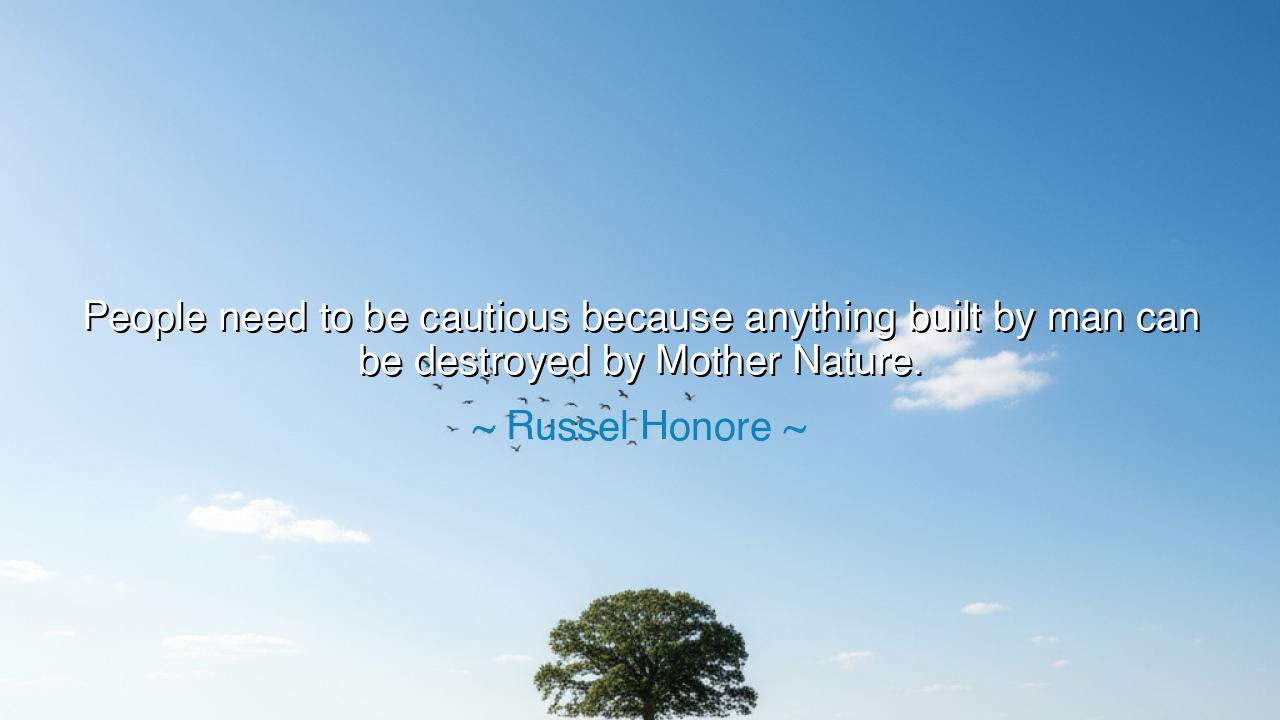
People need to be cautious because anything built by man can be
People need to be cautious because anything built by man can be destroyed by Mother Nature.






In the timeless struggle between humankind and the elements, there echoes a voice of solemn truth — the voice of Russel Honoré, a soldier and servant of the people, who once stood amidst the wreckage left by storm and flood. He said, “People need to be cautious because anything built by man can be destroyed by Mother Nature.” These words are not a mere warning but a revelation — a reminder that our strength, our technology, our proud monuments, are but fragile threads before the vast and eternal power of the Earth. In that truth lies both humility and wisdom, for those who forget the might of Mother Nature are destined to be schooled by her hand.
The meaning of this quote lies in the balance between human ambition and natural law. Man builds towers that pierce the heavens, dams that tame rivers, and cities that glitter through the night — yet all these triumphs rest upon the patience of the Earth. When that patience wears thin, mountains tremble, winds roar, and seas rise in fury. Honoré’s words remind us that creation without respect invites destruction. For every structure, no matter how mighty, is built upon soil, and soil belongs not to us but to the planet that bore us. To be cautious is not to fear the Earth, but to honor her — to recognize that we are stewards, not masters, of her dominion.
The origin of these words springs from a time of great calamity — the aftermath of Hurricane Katrina, when the city of New Orleans lay broken and drowning. Honoré, a general known for his leadership and compassion, led the efforts to bring order and aid to the suffering. He had seen firsthand how the works of men — levees, homes, bridges — were swept aside in a single night by the unleashed force of water and wind. In the ruins, he beheld a truth that all humanity must remember: our power is fleeting, but the power of nature is eternal. His words, born from tragedy, became an enduring teaching — that arrogance before the Earth leads only to ruin.
History has repeated this lesson many times. Think of Pompeii, the thriving Roman city that fell beneath the ash of Mount Vesuvius. Its people, rich and proud, lived in the shadow of the mountain, never believing it could awaken. But when the fire of the Earth rose, their splendor turned to dust in a single day. Or remember Fukushima, where human technology, though advanced beyond measure, faltered before the sea’s wrath. These are not tales of punishment, but of reminder — that no matter how advanced our civilizations become, we remain children beneath the infinite sky.
To live wisely, therefore, is to live with reverence. Let us not build in defiance of the Earth, but in harmony with her. The ancients knew this well — they built temples aligned with the stars, homes that breathed with the wind, and fields that honored the rhythm of the rain. They bowed before the mountains, not out of fear, but out of understanding. Caution, in the ancient sense, is sacred awareness — the recognition that we are guests upon this planet, and that every act of creation must be guided by humility.
Yet even as Honoré’s words warn, they also empower. For to respect nature is not to surrender to it, but to walk in wisdom. When we build with foresight, when we prepare with care, we honor both man and Earth. We design cities that withstand floods, homes that breathe with the wind, and technologies that restore rather than consume. In doing so, we transform caution into resilience, fear into foresight. The wise do not wait for disaster to learn humility; they build their strength upon understanding.
So, my children of the future, remember this truth: anything built by man can be destroyed, but anything built with nature endures. When you shape the world, shape it gently. When you take from the Earth, give something back. Plant trees where walls stand bare, let rivers flow where they once were choked, and never mistake power for permanence. For the Earth is not our enemy, but our mother — fierce, beautiful, and just. She does not destroy in malice, but in reminder.
Thus, let Honoré’s wisdom guide you: build not merely for profit, but for posterity; not against nature, but alongside her. The proud may raise towers of steel, but the wise will raise generations that understand the rhythm of rain and wind. And when the storms come, as they always will, it is not the tallest who survive, but those who remember that Mother Nature gives, and she can take away — and that in her taking, there is always a lesson waiting to be learned.






AAdministratorAdministrator
Welcome, honored guests. Please leave a comment, we will respond soon